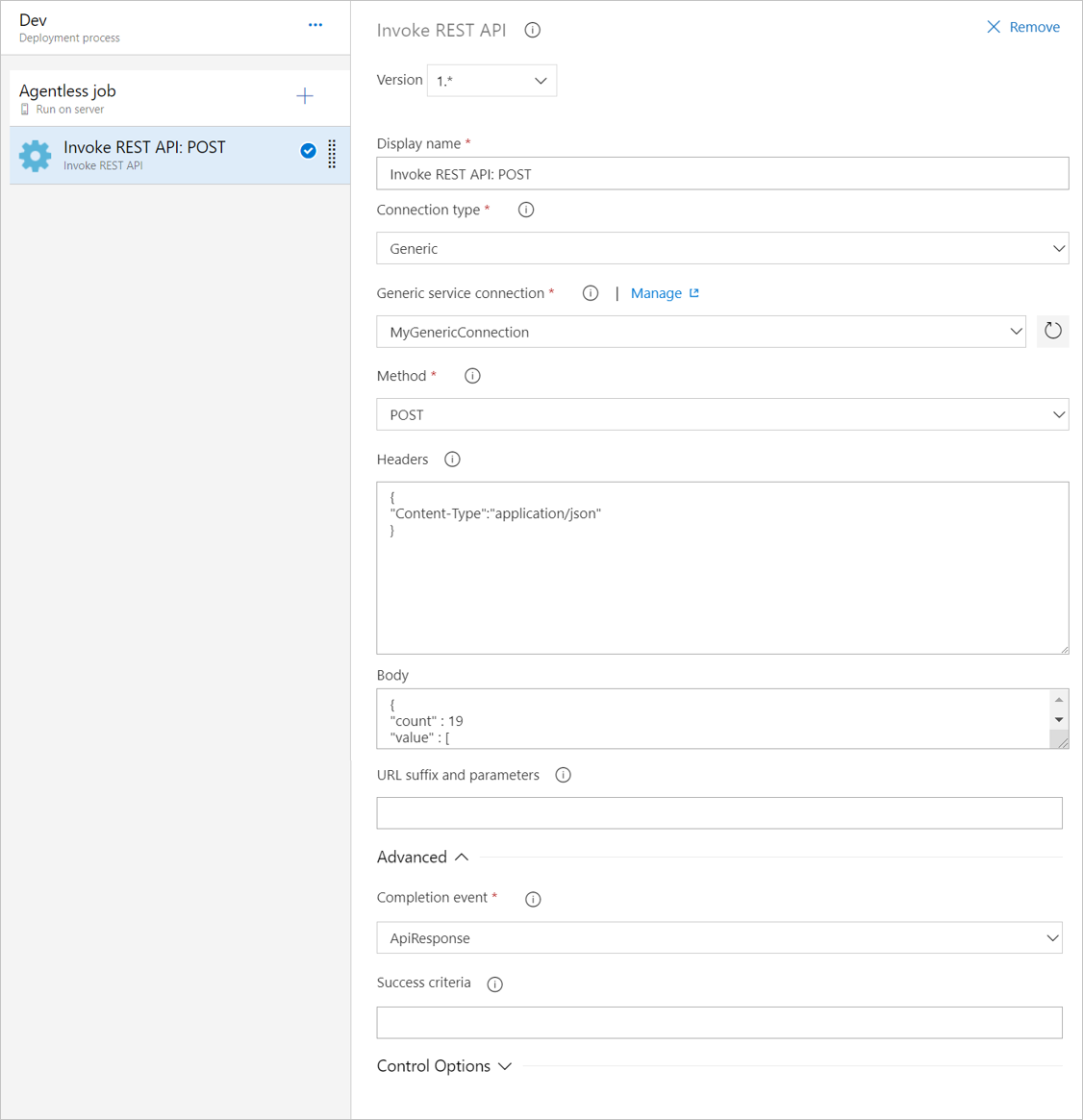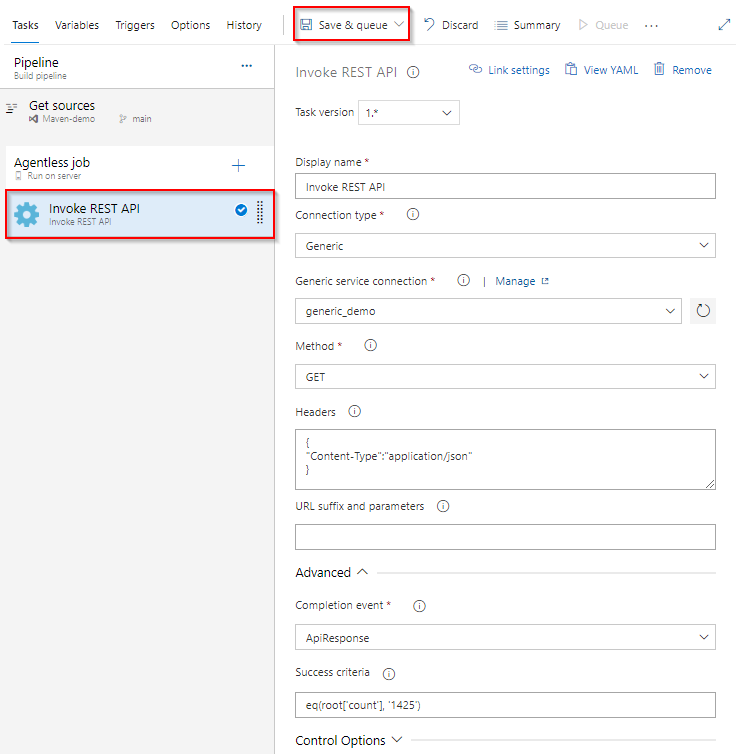InvokeRESTAPI@1 - Invoke REST API v1 task
Use this task to invoke a REST API as a part of your pipeline.
Syntax
# Invoke REST API v1
# Invoke a REST API as a part of your pipeline.
- task: InvokeRESTAPI@1
inputs:
connectionType: 'connectedServiceName' # 'connectedServiceName' | 'connectedServiceNameARM'. Alias: connectedServiceNameSelector. Required. Connection type. Default: connectedServiceName.
serviceConnection: # string. Alias: connectedServiceName | genericService. Required when connectedServiceNameSelector = connectedServiceName. Generic service connection.
#azureServiceConnection: # string. Alias: connectedServiceNameARM | azureSubscription. Required when connectedServiceNameSelector = connectedServiceNameARM. Azure subscription.
method: 'POST' # 'OPTIONS' | 'GET' | 'HEAD' | 'POST' | 'PUT' | 'DELETE' | 'TRACE' | 'PATCH'. Required. Method. Default: POST.
#headers: # string. Headers.
#body: # string. Optional. Use when method != GET && method != HEAD. Body.
#urlSuffix: # string. URL suffix and parameters.
# Advanced
waitForCompletion: 'false' # 'true' | 'false'. Required. Completion event. Default: false.
#successCriteria: # string. Optional. Use when waitForCompletion = false. Success criteria.
# Invoke REST API v1
# Invoke a REST API as a part of your pipeline.
- task: InvokeRESTAPI@1
inputs:
connectionType: 'connectedServiceName' # 'connectedServiceName' | 'connectedServiceNameARM'. Alias: connectedServiceNameSelector. Required. Connection type. Default: connectedServiceName.
serviceConnection: # string. Alias: connectedServiceName. Required when connectedServiceNameSelector = connectedServiceName. Generic service connection.
#azureServiceConnection: # string. Alias: connectedServiceNameARM. Required when connectedServiceNameSelector = connectedServiceNameARM. Azure subscription.
method: 'POST' # 'OPTIONS' | 'GET' | 'HEAD' | 'POST' | 'PUT' | 'DELETE' | 'TRACE' | 'PATCH'. Required. Method. Default: POST.
#headers: # string. Headers.
#body: # string. Optional. Use when method != GET && method != HEAD. Body.
#urlSuffix: # string. URL suffix and parameters.
# Advanced
waitForCompletion: 'false' # 'true' | 'false'. Required. Completion event. Default: false.
#successCriteria: # string. Optional. Use when waitForCompletion = false. Success criteria.
Inputs
connectionType - Connection type
Input alias: connectedServiceNameSelector. string. Required. Allowed values: connectedServiceName (Generic), connectedServiceNameARM (Azure Resource Manager). Default value: connectedServiceName.
Specifies the service connection type to use to invoke the REST API. Select Azure Resource Manager to invoke an Azure management API or Generic for all other APIs.
serviceConnection - Generic service connection
Input alias: connectedServiceName | genericService. string. Required when connectedServiceNameSelector = connectedServiceName.
Specifies the generic service connection that provides the baseUrl for the call and the authorization to use for the task.
serviceConnection - Generic service connection
Input alias: connectedServiceName. string. Required when connectedServiceNameSelector = connectedServiceName.
Specifies the generic service connection that provides the baseUrl for the call and the authorization to use for the task.
azureServiceConnection - Azure subscription
Input alias: connectedServiceNameARM | azureSubscription. string. Required when connectedServiceNameSelector = connectedServiceNameARM.
Specifies the Azure Resource Manager subscription to configure and use for invoking Azure management APIs.
azureServiceConnection - Azure subscription
Input alias: connectedServiceNameARM. string. Required when connectedServiceNameSelector = connectedServiceNameARM.
Specifies the Azure Resource Manager subscription to configure and use for invoking Azure management APIs.
method - Method
string. Required. Allowed values: OPTIONS, GET, HEAD, POST, PUT, DELETE, TRACE, PATCH. Default value: POST.
Specifies the HTTP method that invokes the API.
headers - Headers
string. Default value: {\n"Content-Type":"application/json", \n"PlanUrl": "$(system.CollectionUri)", \n"ProjectId": "$(system.TeamProjectId)", \n"HubName": "$(system.HostType)", \n"PlanId": "$(system.PlanId)", \n"JobId": "$(system.JobId)", \n"TimelineId": "$(system.TimelineId)", \n"TaskInstanceId": "$(system.TaskInstanceId)", \n"AuthToken": "$(system.AccessToken)"\n}.
Defines the header in JSON format. The header is attached with the request sent to the API.
body - Body
string. Optional. Use when method != GET && method != HEAD.
Specifies the request body for the function call in JSON format.
urlSuffix - URL suffix and parameters
string.
Specifies the string to append to the baseUrl from the generic service connection while making the HTTP call.
Example: If the service connection URL is https:...TestProj/_apis/Release/releases and the URL suffix is /2/environments/1, the service connection URL becomes https:.../TestProj/_apis/Release/releases/2/environments/1. If the URL suffix is ?definitionId=1&releaseCount=1, then the service connection URL becomes https//...TestProj/_apis/Release/releases?definitionId=1&releaseCount=1.
waitForCompletion - Completion event
string. Required. Allowed values: true (Callback), false (ApiResponse). Default value: false.
Specifies how the task reports completion. The allowed values are:
false- API response: reports completion when the function returns success within 20 seconds, and the success criteria evaluates to true.true- Callback: reports completion when the external service makes a callback to update the timeline record.
successCriteria - Success criteria
string. Optional. Use when waitForCompletion = false.
Specifies the task's criteria for success. The response content does not influence the result if no criteria is defined. By default, the task passes when the call returns 200 OK.
Example: For response {"status" : "successful"}, the expression can be eq(root['status'], 'successful'). Learn more about specifying conditions.
Task control options
All tasks have control options in addition to their task inputs. For more information, see Control options and common task properties.
Output variables
None.
Remarks
Note
This task can be used only in an agentless job.
Succeeds if the API returns success and the response body parsing is successful, or when the API updates the timeline record with success.
The Invoke REST API task does not perform deployment actions directly. Instead, it allows you to invoke any generic HTTP REST API as part of the automated pipeline and, optionally, wait for it to be completed.

For more information about using this task, see Approvals and gates overview.
What base URLs are used when invoking Azure Management APIs?
Azure management APIs are invoked using ResourceManagerEndpoint of the selected environment. For example https://management.azure.com is used when the subscription is in an AzureCloud environment.
Where should a task signal completion when Callback is chosen as the completion event?
To signal completion, the external service should POST completion data to the following pipelines REST endpoint.
{planUri}/{projectId}/_apis/distributedtask/hubs/{hubName}/plans/{planId}/events?api-version=2.0-preview.1
**Request Body**
{ "name": "TaskCompleted", "taskId": "taskInstanceId", "jobId": "jobId", "result": "succeeded" }
See this simple cmdline application for specifics.
In addition, a C# helper library is available to enable live logging and managing task status for agentless tasks. Learn more
Can I use the response body as the input for another task?
No, as this task is an agentless task and uses TFS's internal HttpRequest, which doesn't return the content of the HTTP request.
Example
steps:
- task: InvokeRESTAPI@1
displayName: 'Invoke REST API: GET'
inputs:
serviceConnection: 'generic_demo'
method: GET
successCriteria: 'eq(root[''count''], ''1425'')'
In this example, the task succeeds when the response matched our successCriteria: eq(root[''count''], ''1425'').
Requirements
| Requirement | Description |
|---|---|
| Pipeline types | YAML, Classic build, Classic release |
| Runs on | Server, ServerGate |
| Demands | None |
| Capabilities | This task does not satisfy any demands for subsequent tasks in the job. |
| Command restrictions | Any |
| Settable variables | Any |
| Agent version | All supported agent versions. |
| Task category | Deploy |

